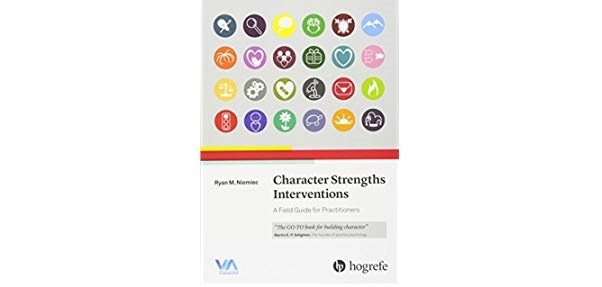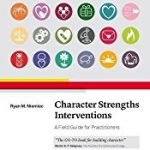
Character Strengths Interventions (Book Review)
Note: This article was originally published in Positive Psychology News Daily. Visit the PPND website or contact me for a list of references.
 Character Strengths Interventions: A Field Guide for Practitioners gives readers a fantastic in-depth tour of the science of the 24 Values-In-Action (VIA) strengths. The guide contains many immediately applicable interventions that can be used with clients. I wished for a reader-friendly guide to the book that recognizes the time pressures that practitioners face. For that reason, I’m going to do my best to provide a “how to use this book” guide at the end of this review.
Character Strengths Interventions: A Field Guide for Practitioners gives readers a fantastic in-depth tour of the science of the 24 Values-In-Action (VIA) strengths. The guide contains many immediately applicable interventions that can be used with clients. I wished for a reader-friendly guide to the book that recognizes the time pressures that practitioners face. For that reason, I’m going to do my best to provide a “how to use this book” guide at the end of this review.
The author is one of the most qualified people on earth to write this book. As the Education Director of the VIA Institute on Character, he helps lead the institution that delivers the VIA Character Strengths assessment, and much of the research around strengths. He develops (or co-develops) VIA’s courses, reports, and programs.
The True Gems
For practitioners like me, the true gems of this book are the tips, snapshots, handouts, and interventions.
Over 20 Strengths-Based Practitioner Tips are included in the book. These tips are clearly set off in boxes and include practical things that practitioners can do to better understand strengths and get their clients to better understand, develop, and act on strengths. For example, the first tip starts with the words, “Context is king,” and suggests ways to reflect on the impact of context on character strength use. My only criticism is that for the first few tips, it’s not clear whether the author is recommending the activity for practitioners or clients. While later tips are clearer, several early tips say things like “Take your highest character strength”, without being clear whether “you” means the practitioner, the client, or both. Practitioners will need to decide for themselves until the tips get more precise later in the book.
Strengths build loving relationships
Also, some of the tips could be more realistic. For example, the author suggests that as practitioners, we rate from 1-10 our use of each of the 24 strengths for a single activity at the beginning, middle, and end of the activity. Really? That’s 720 ratings. I honestly doubt that more than 1% of the population would ever want to invest so much time into seeing how strengths are used for a single activity. But, of course, readers can simply skip over any of the tips they don’t understand or don’t find useful.
The guide includes 24 very useful handouts, one for each of the VIA strengths. These contain a definition, research highlights, questions for strengths building, and interventions. These handouts are fantastic resources to help practitioners and their clients understand the essence of each strength, where to learn more about it, and ways to develop and use it.
There are also a number of snapshots set off in grey boxes. These contain bulleted lists for quick reference to the points made in the preceding text
70 Strengths Interventions
Even better than the handouts are the 70 strengths interventions that make up chapter 8. Most of these interventions come with an overview, the purpose of the intervention, the specific steps involved, and the research behind it. Many of these also come with tips and even troubleshooting ideas. These 70 interventions cover:
- Generously, each of these 70 interventions as well as each of the 24 strength handouts has this text at the bottom: “This page may be reproduced by the purchaser for personal/client use.” This generous sharing allows practitioners to put the book to immediate use with clients. Thank you Dr. Niemiec!Character strengths awareness
- Character strengths use
- Meaning and engagement
- Specific character strengths (e.g., gratitude, love, spirituality)
- Positive relationships
- Resilience (problem management)
- Goal-setting/achievement
- Mindfulness
How to Use this Book
With all these wonderful research-based tips, handouts, and interventions, how could this book be better? By making the practical content easier to find. The book could be improved with the addition of a “how to use this book” section. I’m going to do my best to add one here.
This book is over 300 pages long. If you are not familiar with strengths and how to use them to improve the lives of your clients, you’ll want to read this book from beginning to end. Busy, experienced practitioners like me will want to skip many of those pages and get to the immediately applicable contents. I knew the 70 interventions were in the book, but it still took me quite a while to find them!
So here’s my guide:
If you are more knowledgeable about strengths and experienced in using them with clients, you’ll probably want to skim the first three chapters looking for snapshots, Strengths-Based Practitioner Tips, and the chapter summaries. As an aside, the book would be even more useful if these were gathered up in an appendix.
- Foundations of Strengths-Based Practice: Seven Core Concepts of the Science of Character.
- Signature Strengths: Research and Practice
- Practice Essentials: Six Integration Strategies for a Strengths-Based Practice
Chapters four and five get into misconceptions and advanced issues that all but the most experienced practitioners will want to digest.
4. Behavioral Traps, Misconceptions, and Strategies
5. Advanced Issues in Applying Character Strengths
That will get you to the most useful parts of the book for practitioners: chapter 6 with its 24 VIA strength handouts and chapter 8 with its 70 interventions. In-between is chapter 7, which is largely a guide to chapter 8.
6. Character Strength Spotlights: 24 Practitioner-Friendly Handouts
7. How to Apply Character Strengths Interventions
8. Research-Based Interventions for Character Strengths
After those chapters are an afterword and several appendixes. There is also a strong reference list and a helpful index.
Summary
Character Strengths Interventions is a gold mine for practitioners. Its tips, 24 handouts, and 70 interventions are the most valuable nuggets. Figuring out how to quickly finding those nuggets will make this book even more useful.
I hope this review helps you efficiently strike gold in this valuable book.